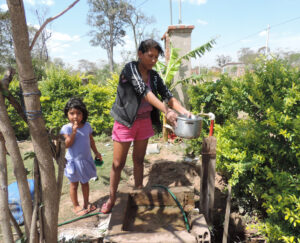Universal and equitable access to drinking water for the population of San Miguel de Velasco, department of Santa Cruz, Bolivia

The main objective of the project is to guarantee the real right of access to drinking water for the population of San Miguel de Velasco, a rural area that is mostly Chiquitana indigenous, through the construction of a water purification plant.
The direct consequence of the lack of access to quality drinking water in the municipality is the high incidence of acute diarrheal diseases in children under five years of age and also of urinary diseases in women, the most vulnerable groups of the population.
The project has a positive impact not only in the control of these diseases linked to water but also in the management of time by women: The time dedicated by women to unpaid domestic work is reduced by eliminating the practice of hauling of water for family consumption. The time that women currently spend on this work ranges from 1 to 3 hours a day. In this way, the conditions of inequality with respect to men are reduced.
In addition, the project incorporates a training and awareness program on disease prevention, hygiene, and responsible water use, aimed at reducing the negative environmental impact.
Medical brigades are organized (a tool adapted to the local culture) that monitor the health status of the population, especially the most vulnerable.
The project supposes an important support to the institutional strengthening (with the creation of the municipal entity of provision of potable water) and of the civil society through a Water Committee for the defense of the right of access to water in conditions of equity for all the population.
Facing the recognition of women as a central element in the supply, management, and protection of water, the project organizes workshops to strengthen their leadership in their neighborhoods and favors their presence in the Water Committee in charge of the representation of civil society before the authorities in relation to the provision of drinking water service. 50% of the positions will be filled by women.

